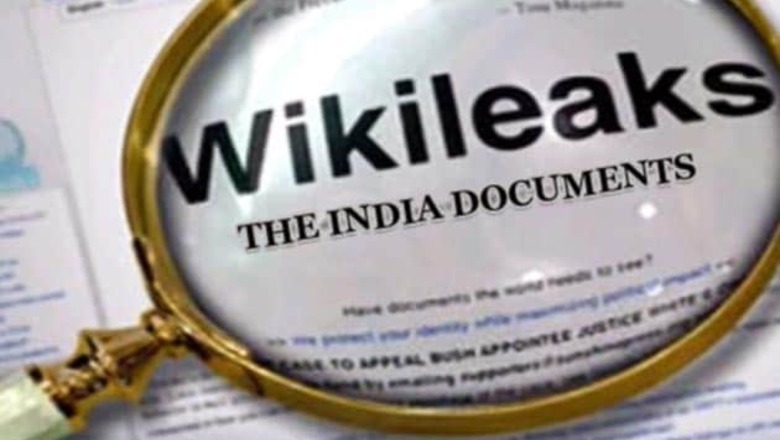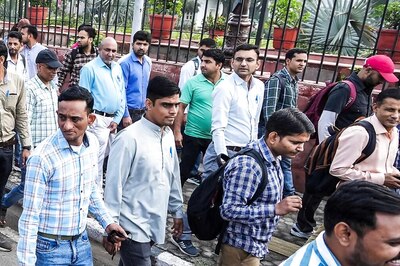
views
Reference ID: 09NEWDELHI412
Created: 2009-03-04 13:01
Released: 2010-12-16 21:09
Classification: SECRET
Origin: Embassy New Delhi
VZCZCXRO9223
OO RUEHBI RUEHCI RUEHDBU RUEHLH RUEHPW
DE RUEHNE #0412/01 0631346
ZNY SSSSS ZZH
O 041346Z MAR 09
FM AMEMBASSY NEW DELHI
TO RHMCSUU/FBI WASHINGTON DC IMMEDIATE
RUEHC/SECSTATE WASHDC IMMEDIATE 5628
INFO RUCNCLS/ALL SOUTH AND CENTRAL ASIA COLLECTIVE
RUEHBJ/AMEMBASSY BEIJING 7435
RUEHLO/AMEMBASSY LONDON 6029
RUEHMO/AMEMBASSY MOSCOW 3159
RUEHKO/AMEMBASSY TOKYO 6137
RHEHAAA/WHITE HOUSE WASHDC
RUEAIIA/CIA WASHDC
RHEHNSC/NSC WASHDC
RUEIDN/DNI WASHINGTON DC
RHMFISS/HQ USCENTCOM MACDILL AFB FL
RHHMUNA/HQ USPACOM HONOLULU HI
RUEKJCS/JOINT STAFF WASHDC
Wednesday, 04 March 2009, 13:46
S E C R E T SECTION 01 OF 03 NEW DELHI 000412
SIPDIS
EO 12958 DECL: 03/03/2019
TAGS PTER, KJUS, PGOV, KCRM, PINR, PREL, IN
SUBJECT: INDIAN NSA SHARES DESIRE FOR COOPERATION WITH
DIRECTOR MUELLER
Classified By: Charge d'Affaires a.i., Steven White for Reasons 1.4 (B, D)
1. (S) Summary. In a cordial March 3 meeting with FBI Director Robert Mueller, Indian National Security Advisor M.K. Narayanan:
-- recognized the importance of the improved cooperation between the U.S. and India since November's terrorist attacks in Mumbai;
-- identified Lashkar-e-Taiba as the number one threat to India, while acknowledging that al Qaeda was the most dangerous threat to most other countries;
-- agreed on the need for India to integrate its intelligence and law enforcement operations as it builds preventative counter-terrorism institutions;
-- described today's extremists as differing from those of the past; they are less likely to be from the economically downtrodden, but now include professionals and affluent religious extremists;
-- suggested that Pakistan's Inter Services Intelligence Directorate (ISI) was the root of India's terrorism problems, adding that major reform of ISI was needed to stop Pakistan's terrorist problems; and
-- dismissed the notion of conducting a joint investigation into the Mumbai attacks with Pakistan, also noting that the existing bilateral Joint Anti-Terror Mechanism had not yielded any tangible results.
End Summary.
Counterterrorism Cooperation
----------------------------
2. (S) FBI Director Robert Mueller met with Indian National Security Advisor M.K. Narayanan March 3 to discuss counter-terrorism, law enforcement and intelligence cooperation. Narayanan began the meeting on a friendly note, describing his experience in fostering Indian relations with the FBI, dating back to his days in the Intelligence Bureau when he was involved in getting the first Indian official to do an exchange with the FBI, and he even recalled a dinner both he and the Director had attended in Toronto in 2001. Narayanan emphasized that he recognized the importance of the improved counter-terrorism cooperation between the U.S. and India following the November 26 attacks in Mumbai, saying the pace of improving relations has been "frenetic" since then and adding that he hoped progress could be maintained. He stressed that what India needed was more than just good liaison work between law enforcement agencies, but broader, real-time, effective cooperation, to include work between our intelligence agencies.
LeT Threat
----------
3. (S) While acknowledging that most of the world considered al Qaeda to be the largest terrorist threat, Narayanan said that India was obsessed with Lashkar-e-Tayyiba (LeT), noting that the LeT was now in over 20 countries and had a global reach. He stated that "there are signs" that another attack on India is being planned, but said the GOI did not have any information on where such an attack would take place or how it would take place. Citing the attack earlier in the day on the Sri Lankan cricket team traveling in Lahore, the National Security Advisor described the ease with which recent attacks have taken place in public, and agreed with the Director on the need for intelligence to uncover attacks in advance.
Terrorists - Changing Demographics
----------------------------------
NEW DELHI 00000412 002 OF 003
4. (S) Narayanan said he "entirely agreed" with the Director's assertion that as India constructs its counter-terrorism institutions, it must integrate law enforcement and intelligence functions, and Director Mueller offered U.S. assistance in helping India build its counter-terror capabilities. Narayanan described several recent cases of interrogations the GOI had conducted, including that of the lone surviving Mumbai terrorist suspect, Mohammad Kasab, which yielded both law enforcement and intelligence information. He then described a changing trend in terrorists being recruited to jihad, saying that while in the past Kashmiri terrorist recruits were vulnerable because they were economically disadvantaged, any of today's terrorists were professionals who came from well-to-do backgrounds. India, with its vast Muslim community living side-by-side with Hindus, was having difficulty identifying the sources of radicalization, he explained, adding that even Muslim leaders XXXXXXXXXXXX were confessing they were "losing control of their flock." India is also seeing the beginnings of Hindu extremist groups that use violence, he said, agreeing with the Director's point that terrorists come from more than just Muslim backgrounds.
Pakistan: The Source
---------------------
5. (S) Referring to Pakistan, Narayanan said India was "next to the epicenter of today's terrorism problem." Offering his advice to the Director for his trip to Pakistan the following day, Narayanan lamented that nearly every major attack on India had come from Pakistan, yet despite numerous promises from Pakistani officials over the years to not allow terrorism to emanate from its soil, the problem is worse than ever. He urged Director Mueller to keep the pressure on Pakistan to prosecute terrorists and dismantle their infrastructure, saying "if you want to end malaria you have to get rid of the swamp." Narayanan acknowledged progress which had been made at times in the past, particularly just prior to President Musharraf's downfall, but said India remains disappointed with the results. He specifically cited the Joint Anti-Terror Mechanism (JATM), which the two countries had established -- despite a lack of popular support for it in India -- as being unproductive, blaming the Pakistanis for not following through on information India provided. In the end, Narayanan maintained, Pakistan will need to fight terrorism for its own purposes, or it will implode. India's interest was not, as one might think, in Pakistan's demise, but rather in a stable Pakistan; "When we say we want a stable Pakistan, it's enlightened self-interest," he said. Given America's experience in dealing with 9/11, Narayanan felt the U.S. should be able to convince Pakistan that if it doesn't deal with terrorism, it won't last.
Narayanan: No Joint Investigation of Mumbai Attacks Now
--------------------------------------------- -------
6. (S) Responding to the Director's comment that Islamabad was seeking a joint investigation of the Mumbai attacks, Narayanan dismissed the idea, saying the timing is not right given the levels of suspicion India and Pakistan have for each other. He referred again to the JATM, saying it had been designed to serve as a vehicle for the sharing of information, but hadn't worked that way. Narayanan felt Pakistan could conduct its own investigation, asserting that if the government is not complicit with the terrorists, it should want to investigate and prosecute those responsible. As India gets "two to three" intercepts per day on possible terrorist activity, the National Security Advisor added that the joint investigation the Pakistanis were offering should be across the board, and not just in response to Mumbai, but India felt it couldn't share that information at this time. Rather than joint investigations, Narayanan encouraged the U.S. to continue to play the role of honest broker in the Mumbai investigation. In response to the Director's suggestion that perhaps India and Pakistan could send investigators to Washington to work together, rather than in India, Narayanan said he could consider it,
NEW DELHI 00000412 003 OF 003
"but at this point both sides are so suspicious of each other that to say India and Pakistan could have an honest joint investigation is difficult." Narayanan acknowledged that India's upcoming general elections -- and more specifically, the politics surrounding them -- would affect the government's ability to cooperate with Pakistan, and said it would be "unpalatable" for the government to agree to a joint investigation at this time.
7. (S) Narayanan ended the meeting by describing ISI as being the root cause of terrorism in Pakistan, and said that in order to effectively address the problem ISI would need to be seriously reformed. The United States has done a lot to pressure ISI, Narayanan opined, particularly the agency's leadership, however, the current ISI -- and its Pakistan Army leadership would not be capable of sufficient reforms by itself. He argued that lower levels of the organization, who often support terrorist attacks without their superiors' knowledge, would also need to be addressed. WHITE
(Reproduced from wikileaks.ch)




















Comments
0 comment